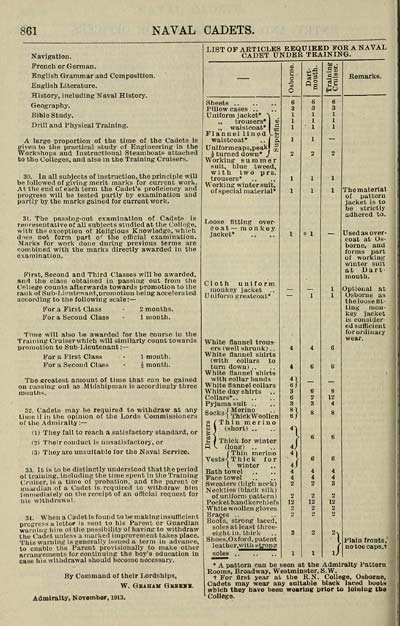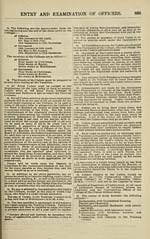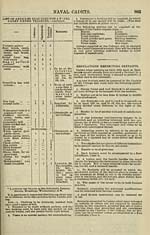Navy lists > Quarterly > 1917 > January
(1844)
Download files
Complete book:
Individual page:
Thumbnail gallery: Grid view | List view

861
NAVAL CADETS.
Navigation.
French or German.
English Grammar and Composition.
English Literature.
History, including Naval History.
Geography.
Bible Study.
Drill and Physical Training.
A large proportion of the time of the Cadets is
given to the practical study of Engineering in the
Workshops and Instructional Steamboats attached
to the Colleges, and also in the Training Cruisers.
30. In all subjects of instruction, the principle will
be followed of giving merit marks for current work.
At the end of each term the Cadet's proficiency and
progress will be tested partly by examination and
partly by the marks gained for current work.
31. The passing-out examination of Cadets is
reoresentative of all subjects studied at the College,
with the exception of Religious Knowledge, which
does not form part o' the official examination.
Marks for work done during previous terms are
combined with the marks directly awarded in the
examination.
First, Second and Third Classes will be awarded,
and the class obtained in passing out from the
College counts afterwards towards promotion to the
rankof Sub-I.ientonant,oromotiou being accelerated
according to the following scale:—
For a First Class - 2 months.
For a Second Class - 1 mouth.
Time will also be awarded for the course iu the
Training Cruiserwhich will similarly count towards
promotion to Sub-Lieutenant:—
For a First Class - 1 month.
For a Second Class - » month.
The greatest amount of time that can be gained
on passing out as Midshipman is accordingly three
mouths.
32. Cadets may be required to withdraw at any
time if in the opinion of the Lords Commissioners
of the Admiralty:—
(1) They fail to reach a satisfactory standard, or
(21 Their conduct is unsatisfactory, or
(3) They are unsuitable for the Naval Service.
33. It is to be distinctly understood that the period
of training, including the time spent in the Training
Cruiser, is a time of probation, and the parent or
guuddian of a Cadet is required to withdraw htm
immediately on the receipt of an official request for
his withdrawal.
34. When a Cadet is found to be making insufficient
progress a letter is sent to his Parent or Guardian
warning him of the possibility of having to withdraw
the Cadet unless a marked improvement takes place.
This warning is generally issued a term in advance,
to enable the Parent provisionally to make other
arrangements for continuing the boy's education in
case his withdrawal should become necessary.
By Command of their Lordships,
W. GBAHAU GltBBXB.
Admiralty, November, 1913.
LIST OF ARTICLES REQUIRED FOR A NAVAL
CADET UNDER TRAINING.
Sheets ..
Pillowcases ..
Uniform jacket* "\ .
„ trousers* I g
„ waistcoat* I §
Flannel lined J-Jj
waistcoat* . . j a
Uniformcaps.peakJ £
a turned down* J
Working summer
suit, blue tweed,
with two prs.
trousers*
Working winter suit,
of special material*
Loose fitting over-
coat— monkey
jacket*
Cloth unifo rm
monkey jacket ..
Uniform greatcoat*
White flannel trous-
ers (well shrunk) ..
White flannel shirts
(with collars to
turn down) ..
White flannel shirts
with collar bands
White flannel collars
White day shirts
Collars*
Pyjama suit ..
s „„ k _f Merino
GOCKS-, rii^i-viT
1 ThickWoollen
Thin merino
(short) ..
Thick for winter
(long) ..
{Thin merino
Thick for
winter
Bath towel
Face towel
Sweaters (high neck)
Neckties (black silk)
of uniform pattern)
Pocket handkerchiefs
White woollen gloves
Braces
Boots, strong laced,
soles at least three-
eight in. thick
Shoes.Oxford, patent
leatber. witli strong
soles
}
}
* A pattern can be seen at the Admiralty Pattern
Rooms, Broadway, Westminster, S.W.
+ For first year at the R.N. College, Osborne,
Cadets may wear any suitable black laced boots
wbich they have been wearing prior to Joining the
College.
NAVAL CADETS.
Navigation.
French or German.
English Grammar and Composition.
English Literature.
History, including Naval History.
Geography.
Bible Study.
Drill and Physical Training.
A large proportion of the time of the Cadets is
given to the practical study of Engineering in the
Workshops and Instructional Steamboats attached
to the Colleges, and also in the Training Cruisers.
30. In all subjects of instruction, the principle will
be followed of giving merit marks for current work.
At the end of each term the Cadet's proficiency and
progress will be tested partly by examination and
partly by the marks gained for current work.
31. The passing-out examination of Cadets is
reoresentative of all subjects studied at the College,
with the exception of Religious Knowledge, which
does not form part o' the official examination.
Marks for work done during previous terms are
combined with the marks directly awarded in the
examination.
First, Second and Third Classes will be awarded,
and the class obtained in passing out from the
College counts afterwards towards promotion to the
rankof Sub-I.ientonant,oromotiou being accelerated
according to the following scale:—
For a First Class - 2 months.
For a Second Class - 1 mouth.
Time will also be awarded for the course iu the
Training Cruiserwhich will similarly count towards
promotion to Sub-Lieutenant:—
For a First Class - 1 month.
For a Second Class - » month.
The greatest amount of time that can be gained
on passing out as Midshipman is accordingly three
mouths.
32. Cadets may be required to withdraw at any
time if in the opinion of the Lords Commissioners
of the Admiralty:—
(1) They fail to reach a satisfactory standard, or
(21 Their conduct is unsatisfactory, or
(3) They are unsuitable for the Naval Service.
33. It is to be distinctly understood that the period
of training, including the time spent in the Training
Cruiser, is a time of probation, and the parent or
guuddian of a Cadet is required to withdraw htm
immediately on the receipt of an official request for
his withdrawal.
34. When a Cadet is found to be making insufficient
progress a letter is sent to his Parent or Guardian
warning him of the possibility of having to withdraw
the Cadet unless a marked improvement takes place.
This warning is generally issued a term in advance,
to enable the Parent provisionally to make other
arrangements for continuing the boy's education in
case his withdrawal should become necessary.
By Command of their Lordships,
W. GBAHAU GltBBXB.
Admiralty, November, 1913.
LIST OF ARTICLES REQUIRED FOR A NAVAL
CADET UNDER TRAINING.
Sheets ..
Pillowcases ..
Uniform jacket* "\ .
„ trousers* I g
„ waistcoat* I §
Flannel lined J-Jj
waistcoat* . . j a
Uniformcaps.peakJ £
a turned down* J
Working summer
suit, blue tweed,
with two prs.
trousers*
Working winter suit,
of special material*
Loose fitting over-
coat— monkey
jacket*
Cloth unifo rm
monkey jacket ..
Uniform greatcoat*
White flannel trous-
ers (well shrunk) ..
White flannel shirts
(with collars to
turn down) ..
White flannel shirts
with collar bands
White flannel collars
White day shirts
Collars*
Pyjama suit ..
s „„ k _f Merino
GOCKS-, rii^i-viT
1 ThickWoollen
Thin merino
(short) ..
Thick for winter
(long) ..
{Thin merino
Thick for
winter
Bath towel
Face towel
Sweaters (high neck)
Neckties (black silk)
of uniform pattern)
Pocket handkerchiefs
White woollen gloves
Braces
Boots, strong laced,
soles at least three-
eight in. thick
Shoes.Oxford, patent
leatber. witli strong
soles
}
}
* A pattern can be seen at the Admiralty Pattern
Rooms, Broadway, Westminster, S.W.
+ For first year at the R.N. College, Osborne,
Cadets may wear any suitable black laced boots
wbich they have been wearing prior to Joining the
College.
Set display mode to: Large image | Transcription
Images and transcriptions on this page, including medium image downloads, may be used under the Creative Commons Attribution 4.0 International Licence unless otherwise stated. ![]()
| British Military lists > Navy lists > Quarterly > 1917 > January > (1844) |
|---|
| Permanent URL | https://digital.nls.uk/92121170 |
|---|
| Description | Corrected to the 18th December, 1916. |
|---|---|
| Attribution and copyright: |
|
| Description | These lists cover 1913 to 1921 and 1944 to 1945. From April 1814 to January 1924 and again from October 1944 to April 1949 navy lists were produced quarterly. |
|---|

